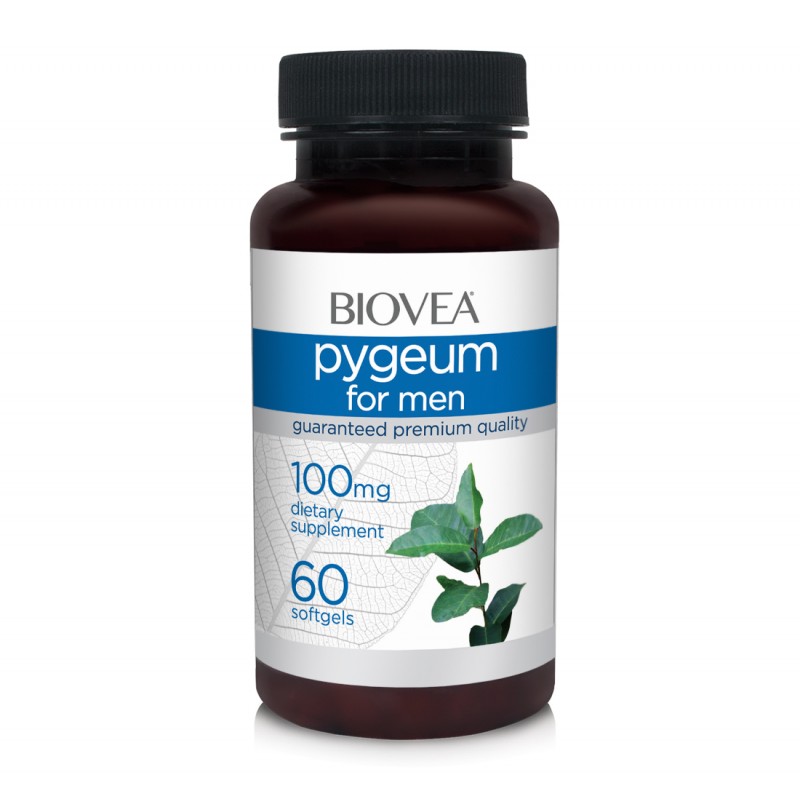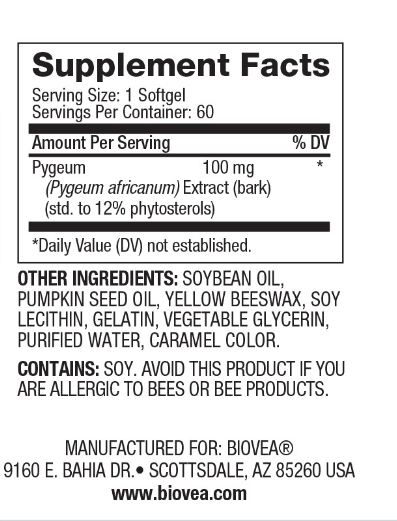
Out of stock
Biovea Pygeum - Pygeum
- Model: 60 sgels
- Brand: Biovea
- Баркод: 818423023786
12,27 €
- Reducing prostate swelling
- Reduces cholesterol
- Helps regulate the immune system
- Regulates insulin activity
- Improves the natural flow of prostate secretions
Out of stock
- Description
- Product content
What is Pygeum?
Pygeum Africanum is the bark of an evergreen tree native to certain regions of Africa. The bark is usually not harvested until the tree is fully grown. The bark contains three groups of active ingredients: phytosterols (such as beta-sitosterol), pentacyclic triterpenoids (including ursolic and oleic acids), and ferulic esters of long-chain fatty alcohols (including ferulic esters of docosanol and tetracosanol).
The bark of the tree contains an oil with many active ingredients; waxes, fatty acids, and other lesser-known compounds. The main biological activity of Pygeum is traced to a “phytosterol” compound known as beta-sitosterol. Phyto (plant) sterols are structurally similar to, but much less efficiently absorbed from the diet than cholesterol. However, the biological potency of phytosterols is similar to that of hormones; therefore, a very small amount appears to be sufficient to initiate a response.
Why should you take Pygeum?
Pygeum has been shown to have many benefits for men’s health and their prostate. Pygeum is primarily used to treat benign prostatic hypertrophy, or BPH, a condition that affects men as early as their 40s, but becomes more common with age: 30% of men in their fifties; 50% of men in their sixties; and nearly 80% of men in their 70s and older. BPH involves two changes in the prostate: increased size and increased tissue density. These changes cause symptoms of frequent urination with small volumes, decreased prostatic secretion, and decreased bladder emptying. Incomplete bladder emptying increases the risk of bladder infections, swelling, and inflammation. It has also been shown to improve blood sugar levels and immune function.
It has been found to be beneficial in the associated condition of chronic prostatitis, with and without prostate-related sexual dysfunction, and infertility due to decreased prostatic secretion. Due to its actions as an “up-regulator” of the immune system and anti-inflammatory, pygeum is also being studied for use with other treatments for hepatitis C and HIV.
Pygeum phytosterols are anti-inflammatory. Pygeum also reduces edema (swelling caused by excess fluid), reduces levels of the hormone prolactin, and lowers and inhibits cholesterol activity in the prostate. Prolactin, which is increased by drinking beer, stimulates the prostate to absorb testosterone, and is reported to increase levels of a metabolite responsible for prostate cell enlargement, dihydrotestosterone (DHT). Cholesterol is reported to increase the effects of DHT.
Europeans learned of the plant's usefulness in treating what was then known as "old man's disease." It continues to be widely popular in Europe as a remedy for BPH, especially in France, where the use of African pigweed for BPH is reported to be around 80%.
Who needs it and what are some symptoms of deficiency? Are there any side effects?
It is commonly used to maintain prostate health in men over 50. There are no symptoms of deficiency.
There are no known drug interactions, but in some rare cases, nausea may occur while taking Pygeum.
Method of use: Take 1 softgel twice daily, preferably with meals.



 0878 567 491
0878 567 491

